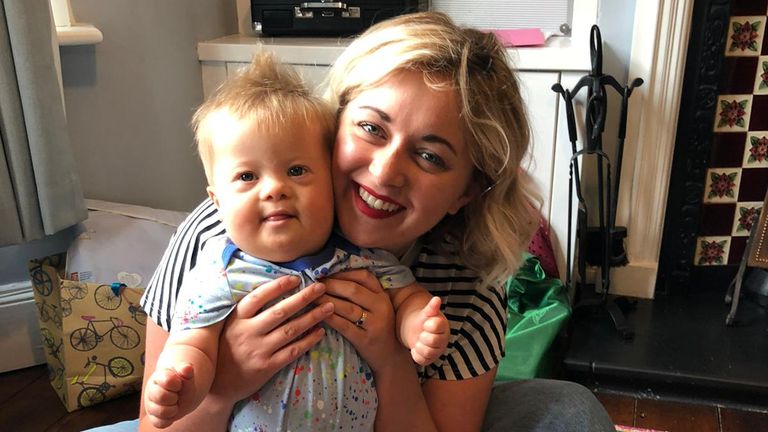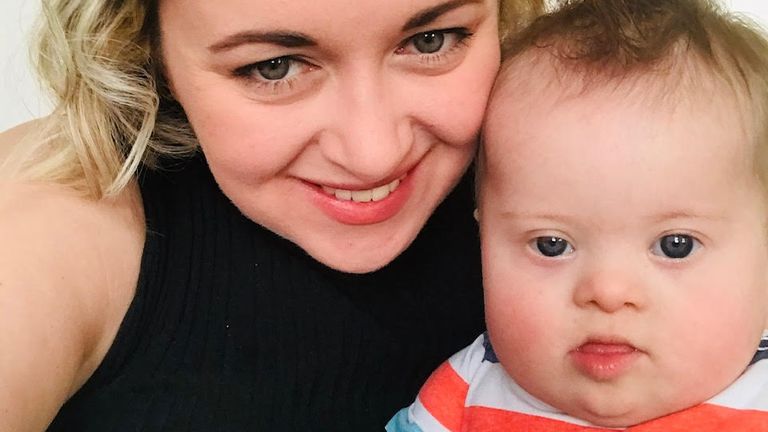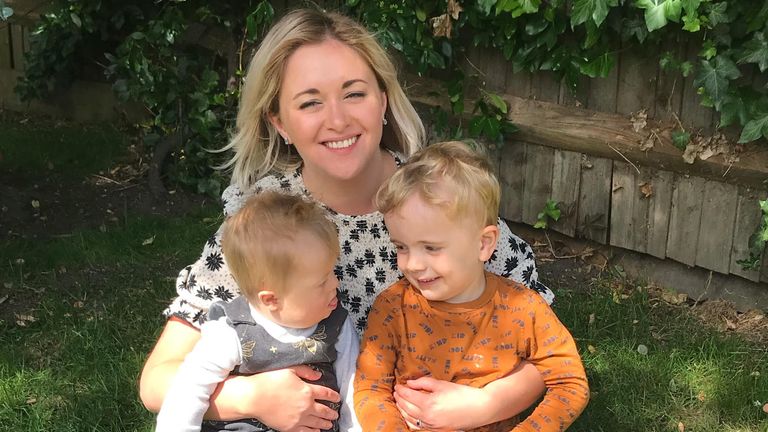Máire Lea-Wilson gave birth to her son Aidan at 36 weeks – when the law still permitted her to have an abortion.
Sunday 18 October 2020 06:35, UK
In the UK, abortions are legal after the normal 24-week limit if Down’s syndrome is detected in a foetus.
I am the mother of two headstrong, determined, independent and loving boys.
As their mother, they need me to care for them, to teach them about the world, to protect them, to love them and to value them. I value them equally; but the law does not.
The reason for this is that Aidan has Down’s syndrome.
Currently, in the UK, there is a 24-week limit for abortion, but if the baby has a disability such as Down’s syndrome, abortion is legal right up until birth.
I was 34 weeks pregnant when I discovered that Aidan would have Down’s syndrome.
There had been no indications of this throughout the pregnancy, and so it came as a huge shock to us.
My immediate reaction to the news was one of overwhelming grief, for what I believed I had lost, and a fear of the reality I was now confronted with.
During this time of great vulnerability, I was told that my child would not be able to live independently, might not be able to walk or talk, would suffer through surgeries to correct his intestinal issues and possible congenital heart defects, that there was a high chance of stillbirth, and that he would make our lives so much more challenging.
Within the context of this fear, vulnerability, and biased information, I was offered an abortion three times.
The fact that I could have an abortion at such a late stage of pregnancy, made me feel like Down’s syndrome must be very, very bad indeed.
With the strength and support of my family and friends, I continued my pregnancy and gave birth to my beautiful baby boy at 36 weeks and three days, a time at which he still could have been aborted.
Aidan is now 16 months old. He has exceeded all my expectations; he is an absolute delight and is loved by everyone who meets him.
He has faced challenges, but he has met them all with strength, fortitude, grace and dignity.
He has taught our little family so much about compassion, empathy and acceptance.
He is a joy and I am so incredibly proud of him. I would not change a single thing about him.
It would be disingenuous of me to say that I do not worry about Aidan’s future.
Aidan may never be able to do the things they said he wouldn’t; he may be able to do them all.
No medical professional can predict the future of any child, extra chromosome or not.
As time has passed, I have learned to try not to predict Aidan’s future and realised that most of my worries really are not about Aidan at all; they stem from societal attitudes towards disability.
Will he be supported? Will he be treated fairly? Will he be valued equally? No mother should have to face these concerns, but this is something I must deal with every day, because of the law and the clear message it sends to me about my son.
We live in a society that proclaims that we want to empower those with disabilities, and that regardless of your background, you deserve a fair and equal chance at life.
This law, which allows abortion up until birth, is outdated, and we can do so much better than this.
I want my children to grow up knowing that we truly are all equally valued, regardless of ability status.
My reason for bringing this joint legal action to try and change the law is simple; as a mother, I will do everything in my power to make sure my child is treated fairly and equally. My reason is Aidan.
In response to Ms Lea-Wilson’s piece, the Department of Health and Social Care, and The British Pregnancy Advisory Service provided these statements:
The Department of Health and Social Care
The decision to end what is usually a wanted pregnancy can be extremely difficult and painful. Counselling is available at all stages of the screening pathway to support people as they come to terms with this extremely important decision.
Regardless of how an abnormality is detected or suspected, a woman has to be given time to understand the nature and severity of the condition so they are able to reach an informed decision about how to proceed – and whether to continue with the pregnancy or seek a termination. Arrangements should be made for the woman to see an expert who has knowledge about the abnormality and the options available.
At no stage should there be a bias towards abortion. All staff involved in the care of a woman or couple facing a possible termination of pregnancy must adopt a nondirective, non-judgemental and supportive approach. It is important that if anyone receives information they feel to be biased or in any way inappropriate that they raise this within the service or hospital concerned.
The British Pregnancy Advisory Service
The nature and implications of some conditions in pregnancy may not be properly understood until after 24 weeks, and this is why the law gives women and their doctors time to reach informed decisions in what are often the most heartbreaking of circumstances.
Introducing a time limit for non-fatal conditions – but ones which may have profound and life limiting consequences for a child – will mean some women will be forced to make a choice about ending a pregnancy before they hit a sharp cut-off and eliminates the opportunity for ongoing monitoring, assessment and understanding before a decision is made.
These are intensely personal, difficult decisions which a small number of women and their families will sadly have to make each year: no woman should ever feel pressured to end a pregnancy after a diagnosis has been made but neither should she ever be forced to continue one when she knows it is not right to do so.
Source: sky.com




